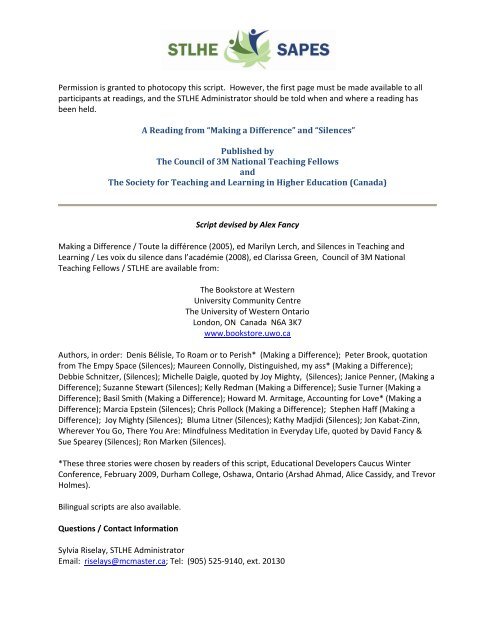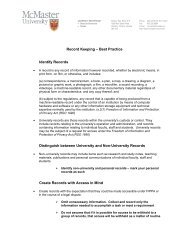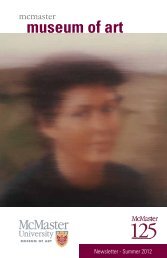Silences Script By Alex Fancy - McMaster University
Silences Script By Alex Fancy - McMaster University
Silences Script By Alex Fancy - McMaster University
Create successful ePaper yourself
Turn your PDF publications into a flip-book with our unique Google optimized e-Paper software.
Permission is granted to photocopy this script. However, the first page must be made available to all<br />
participants at readings, and the STLHE Administrator should be told when and where a reading has<br />
been held.<br />
A Reading from “Making a Difference” and “<strong>Silences</strong>”<br />
Published by<br />
The Council of 3M National Teaching Fellows<br />
and<br />
The Society for Teaching and Learning in Higher Education (Canada)<br />
<strong>Script</strong> devised by <strong>Alex</strong> <strong>Fancy</strong><br />
Making a Difference / Toute la différence (2005), ed Marilyn Lerch, and <strong>Silences</strong> in Teaching and<br />
Learning / Les voix du silence dans l’académie (2008), ed Clarissa Green, Council of 3M National<br />
Teaching Fellows / STLHE are available from:<br />
The Bookstore at Western<br />
<strong>University</strong> Community Centre<br />
The <strong>University</strong> of Western Ontario<br />
London, ON Canada N6A 3K7<br />
www.bookstore.uwo.ca<br />
Authors, in order: Denis Bélisle, To Roam or to Perish* (Making a Difference); Peter Brook, quotation<br />
from The Empy Space (<strong>Silences</strong>); Maureen Connolly, Distinguished, my ass* (Making a Difference);<br />
Debbie Schnitzer, (<strong>Silences</strong>); Michelle Daigle, quoted by Joy Mighty, (<strong>Silences</strong>); Janice Penner, (Making a<br />
Difference); Suzanne Stewart (<strong>Silences</strong>); Kelly Redman (Making a Difference); Susie Turner (Making a<br />
Difference); Basil Smith (Making a Difference); Howard M. Armitage, Accounting for Love* (Making a<br />
Difference); Marcia Epstein (<strong>Silences</strong>); Chris Pollock (Making a Difference); Stephen Haff (Making a<br />
Difference); Joy Mighty (<strong>Silences</strong>); Bluma Litner (<strong>Silences</strong>); Kathy Madjidi (<strong>Silences</strong>); Jon Kabat‐Zinn,<br />
Wherever You Go, There You Are: Mindfulness Meditation in Everyday Life, quoted by David <strong>Fancy</strong> &<br />
Sue Spearey (<strong>Silences</strong>); Ron Marken (<strong>Silences</strong>).<br />
*These three stories were chosen by readers of this script, Educational Developers Caucus Winter<br />
Conference, February 2009, Durham College, Oshawa, Ontario (Arshad Ahmad, Alice Cassidy, and Trevor<br />
Holmes).<br />
Bilingual scripts are also available.<br />
Questions / Contact Information<br />
Sylvia Riselay, STLHE Administrator<br />
Email: riselays@mcmaster.ca; Tel: (905) 525‐9140, ext. 20130
Stage Directions<br />
A Reading from “Making a Difference” and “<strong>Silences</strong>”<br />
Published by<br />
The Council of 3M National Teaching Fellows<br />
and<br />
The Society for Teaching and Learning in Higher Education (Canada)<br />
1. Readers can begin close to each other. During the reading they should move throughout the<br />
room, coming back to their point of departure for the final, brief choral reading.<br />
2. Try to move between excerpts.<br />
3. Try to plan your itinerary a move or two in advance!<br />
4. Adapt your voice to what you think is the mood of the extract.<br />
Page | 1<br />
5. Without losing your place in the script, try to focus your attention squarely on the person who is<br />
reading.<br />
6. Don’t let your voice trail at the end of a sentence, as you might do in conversation. Work up to<br />
the final syllable.<br />
7. ‘Line‐topping’: in most cases (unless a pause is prescribed) your first syllable should coincide with<br />
the last syllabe uttered by the previous speaker. Link the extracts, but take your time in mid‐<br />
speech to inflect and shape.<br />
8. Make sure that your pages are in order before you begin.<br />
9. It is helpful to highlight all your lines, and to write very brief, clear notes in the margin (stress,<br />
slow, speed up, etc.).<br />
10. Break a leg!<br />
Suggested Presentation Format<br />
The reading can be followed by a discussion, perhaps in break‐out groups followed by the general<br />
discussion.
SCRIPT<br />
Page | 2<br />
Reader 1—I first met him more than twenty years ago in a tightly packed classroom where fifty young<br />
adults were waiting as in a theatre but without the barely contained excitement, seats<br />
arranged in graduated levels around a central platform, which until then had been for me a<br />
pulpit devoted to dispensing “scores” already read and heard too many times.<br />
Reader 2—Vitality and boredom wait together, between two silences.<br />
Reader 3—The first time I experienced depression was the summer of 1997 when my partner’s two<br />
sons—aged nine and eleven, bright, precocious and somewhat devious—spent the summer<br />
with us.<br />
Reader 2—Why is so much of the “real” world terminated as soon as we enter our “hallowed” halls?<br />
Reader 1—Nothing new under the rain on this September morning in 1980, even less in this damp room<br />
smelling of raincoats and wet clothes, as all busied with the cult objects of academe:<br />
notebooks, books, pencils, everyone preparing and dedicating their small altar for the<br />
ceremony of note‐taking. I came with cigarettes, coffee, and the conviction that for anyone<br />
who has a little imagination, it is impossible not to waste one’s life.<br />
Reader 2—"I attended a course on race relations that purported to incorporate equity concerns but had<br />
nothing on Aboriginal peoples . . ."<br />
Reader 3—Before this, depression was something that other people, without my considerable strength<br />
of character and willpower, experienced. Nothing prepared me for the slide into<br />
worthlessness and unrequited rage. The real kicker was that the boys weren’t all that bad.<br />
They were just boys.<br />
Reader 2—One day we started talking about grief and soon were deep into personal stories. She altered<br />
the agenda to allow us to spend the rest of the class on the subject of grief and loss (....)<br />
Some of the students admitted to never having shared these intense and personal stories<br />
with anyone before. In her classes, we talked, we argued, we listened, we laughed and we<br />
cried. We were often loud and sometimes very quiet and somber. Through all of this, we<br />
learned.<br />
Reader 1—My first year at university had offered nothing but boundless emptiness of meaning,<br />
dispensed by insensible glottises, braying litanies of old recipes that pulled hundreds of eyes<br />
down to scribblings rather than lifting them toward something worth looking at. As soon as<br />
the last exam had been written, my throat on fire, I fled with thirty dollars in my pocket and<br />
thumbed my way west.<br />
Reader 3—I would go to the bathroom, turn on the shower, and cry and cry. I would cry in other places<br />
and times as well and the summer unfolded into a succession of driving, cooking, cleaning<br />
and laundry commercials interrupted by daily rituals of tears and self‐loathing.<br />
Reader 1—That summer I wandered more than 15,000 kilometers, taking odd jobs as necessity dictated,<br />
lingering in mountains and cities (....) I met other students, workers, native peoples, travelers<br />
all, on the move, against the various backdrops of the world, boulevards, ocean, skyscrapers,
Page | 3<br />
cliffs, houses, forests. A career? Not for me. My sole aim was always to experience the<br />
human condition, and its most sublime expression seemed to be this inner life, this fluid<br />
pulsation of thought rising and falling of which no one ever speaks.<br />
Reader 2—As instructors, we are advised to teach with integrity, and to be “who we are” in the<br />
classroom, but that advice is complicated when softness of voice and gentleness of character<br />
are seemingly at odds with a vocation that entails speaking dynamically and confidently<br />
about our knowledge. I have come to believe that quietness, while it is a reflection of my<br />
true inner self, is not a legitimate teacherly trait.<br />
Reader 3—Fast forward six years. The phone rings in my office.<br />
Reader 2—Many times I would pop up to her office for help before an exam, along with two or three<br />
friends. She would simply move some books aside and make room for everyone.<br />
Reader 3—I find myself gazing around the space as I contemplate answering (...) Shelves are piled high<br />
with books and files, the gifts of students, mugs, figurines, pictures of my nephew. There are<br />
unpacked boxes that reach the ceiling stacked on the corner of my long desk.<br />
Reader 2—When she fell ill, she convinced the Faculty with great faith and optimism to permit us to<br />
teach the course in her absence. It was an honour to have been given such an opportunity<br />
and to have been trusted to present properly the curriculum she had devised.<br />
Reader 3—A dresser sits in the corner, containing my fitness and training clothes. CDs and tapes are<br />
piled near the phone, my briefcase is hanging open, a mouth for papers, memos and more<br />
work to finish at home. My students wonder if I am moving in or moving out. This semester’s<br />
course and committee files are my only anchor to the here and now. And I am here, now. I<br />
am tired of here and now.<br />
Reader 2—(His) consistent encouragement for people to take risks in their learning, to see their learning<br />
as a precipitate of possibilities that can coalesce into a lasting sense of one’s own possibility<br />
as an agent in the world—as opposed to simply a consumer acquiring a product, or a devotee<br />
receiving sacred unction—can result in a pedagogy of liberation, of constant engagement and<br />
becoming.<br />
Reader 3—I feel the familiar and terrifying slide beginning. And it’s not that things are that bad.<br />
Reader 1—In the fall, like a migratory bird, I returned to school. <strong>By</strong> habit. That very morning, that back‐<br />
to‐school morning, making my way among the umbrellas and notebooks, I made a<br />
momentous decision: if something dramatically different does not happen soon, by next<br />
week, I’m going west again. To hell with this masquerade!<br />
Reader 3—It’s a fairly regular semester, a fairly typical day. I answer the phone. It’s Jill ‐ her usual,<br />
damn chipper, high‐energy, see‐the‐good‐in‐everyone self. She needs a title from me for the<br />
distinguished teaching award address I will give in May.<br />
Reader 1—9:10 am—He is late. He walks in, a cup of coffee in his hand. No books, no documents. He<br />
looks at us almost en passant, smiles, takes a sip of coffee. He paces through the room,<br />
glancing at us from time to time. For a few minutes, that is all he does. Suddenly, he stops
Page | 4<br />
and declares, “Hello. I’m here to travel with you on a stretch of road this term. I speak fast. I<br />
know I speak fast. I speak fast because I don’t want you to take notes. In this class, there will<br />
be no books, no exam. Rather we will talk—talk about knowledge ….” And then he begins,<br />
his flow of thought pushes him to resume the pacing, back and forth, and like a big cat in his<br />
cage, he makes us dream of freedom.<br />
Reader 3—I say to her “How about the university’s fucked and nothing that we do makes any<br />
difference?”<br />
Reader 2—The dinner guests were sitting around the table discussing life. One man, a CEO, decided to<br />
explain the problem with education.<br />
Reader 3—There is a long silence. Jill clears her throat.<br />
Pause.<br />
Reader 2—He argued, “What’s a kid going to learn from someone who decided his best option in life<br />
was to become a teacher?” He reminded the other dinner guests that it’s true what they say<br />
about teachers. “Those who can, do. Those who can’t, teach.” The guests all laughed.<br />
Reader 3—"Not a good time to ask you about this?" she asks. I wish that I had some magic button to<br />
stop the horrible ache in my throat and the tears in my eyes. I take off my glasses. The office<br />
fades to merciful fuzziness, the evidence of my incompetence temporarily, thankfully,<br />
blurred.<br />
“Give me a half hour,” I tell her.<br />
Reader 1—I did not go back west the next week. Ten years later I was completing my doctoral studies<br />
with this character who in no way resembles how I pictured a university professor. Look at<br />
him: he laughs, he enjoys himself. He is bold, takes risks, and sometimes, God forbid, he is<br />
wrong.<br />
Reader 2—To emphasize his point, he singled out one of the diners. “You’re a professor, Susan,” he<br />
said. “Be honest. What do you make?”<br />
Reader 1—It has been a fabulous journey, swept along in his wake, like a wave pushing me towards my<br />
own discoveries.<br />
Reader 2—Susan, who had a reputation for frankness, replied, "So, you want to know what I make?”<br />
Reader 3—Silence is like speech in having cultural norms and conventions. While it is usually regarded<br />
in current Western culture as an absence of sound, a passive state, silence is also an activity.<br />
Reader 2—I make students work harder than they ever thought they could.<br />
Reader 1—I have had scores of teachers, some of whom did not lack intelligence, scholarship or<br />
benevolence, but in light of the longing and intensity which marked my youth, I often have<br />
the impression that, as far as professors go, I only had one.
Page | 5<br />
Reader 3—While he was supervising my undergraduate thesis research, he sent me for a one‐week<br />
astronomy research trip. When I returned and discovered that I had pointed the telescope at<br />
the Big Dipper instead of the Little Dipper, he worked patiently and enthusiastically with me<br />
for two weeks to salvage useful data from the wrong Dipper!<br />
Reader 2—I can make kids sit through ninety minutes of class and completely absorb their attention.<br />
Reader 1—He handed us courage as directly and palpably as you hand a kid a hockey stick. Now, nearly<br />
twenty years later, I can reflect on the perennial return of his teaching in my life.<br />
Reader 2—I can make students want to learn and practice their discipline.<br />
Reader 3—(...) Do our methodologies perpetuate the silencing of marginalized groups?<br />
Reader 1—When I first began teaching, there were few traces in the classroom of my embodied<br />
presence. I was expected to be an entity without context; a disembodied, thinking, living, teaching‐a‐<br />
particular‐course presence to a classroom filled with disembodied students.<br />
Reader 2—You want to know what I make? I make students wonder.<br />
Reader 3—In many indigenous cultures, making space for periods of silence and reflection is an integral<br />
part of education.<br />
Reader 2—I make them question.<br />
Reader 1—“Think of yourself as an eternal witness, as timeless. Just watch this moment, without trying<br />
to change it at all. What is happening? What do you feel? What do you see? What do you<br />
hear?”<br />
Reader 3—(...) Awareness practices (...) invite practitioners to address the plenitude and complexity of<br />
their present circumstances by engaging in acts of witnessing.<br />
Reader 2—I make them criticize. I make them sensitive to different opinions.<br />
Reader 1—Our students live in cacaphony.<br />
Reader 3—Clamour, chatter, and din fill their ears, and may even injure them.<br />
Reader 1—I cannot ask them to put their heads down on their desks and be quiet, as Mrs. Morgan<br />
commanded me to do in Grade 2.<br />
Reader 2—I make them write.<br />
Reader 3— I make them read.<br />
Reader 1—I make them do.<br />
Reader 3—I make them know I will review their work for grammar, logic and content.
Readers 1 and 2—I make them experience the joy of learning.<br />
Readers 1 and 3—Appreciate the meaning of good performance.<br />
Readers 1, 2 and 3—And take pride in themselves and their accomplishments.<br />
Reader 3—I make them understand that if you have the brains, then follow your heart.<br />
Reader 2—And if someone ever tries to judge you by what you make . . .<br />
Page | 6<br />
Readers 1, 2 and 3—You pay them no attention. You want to know what I make? I make a difference.<br />
What do you make?
















